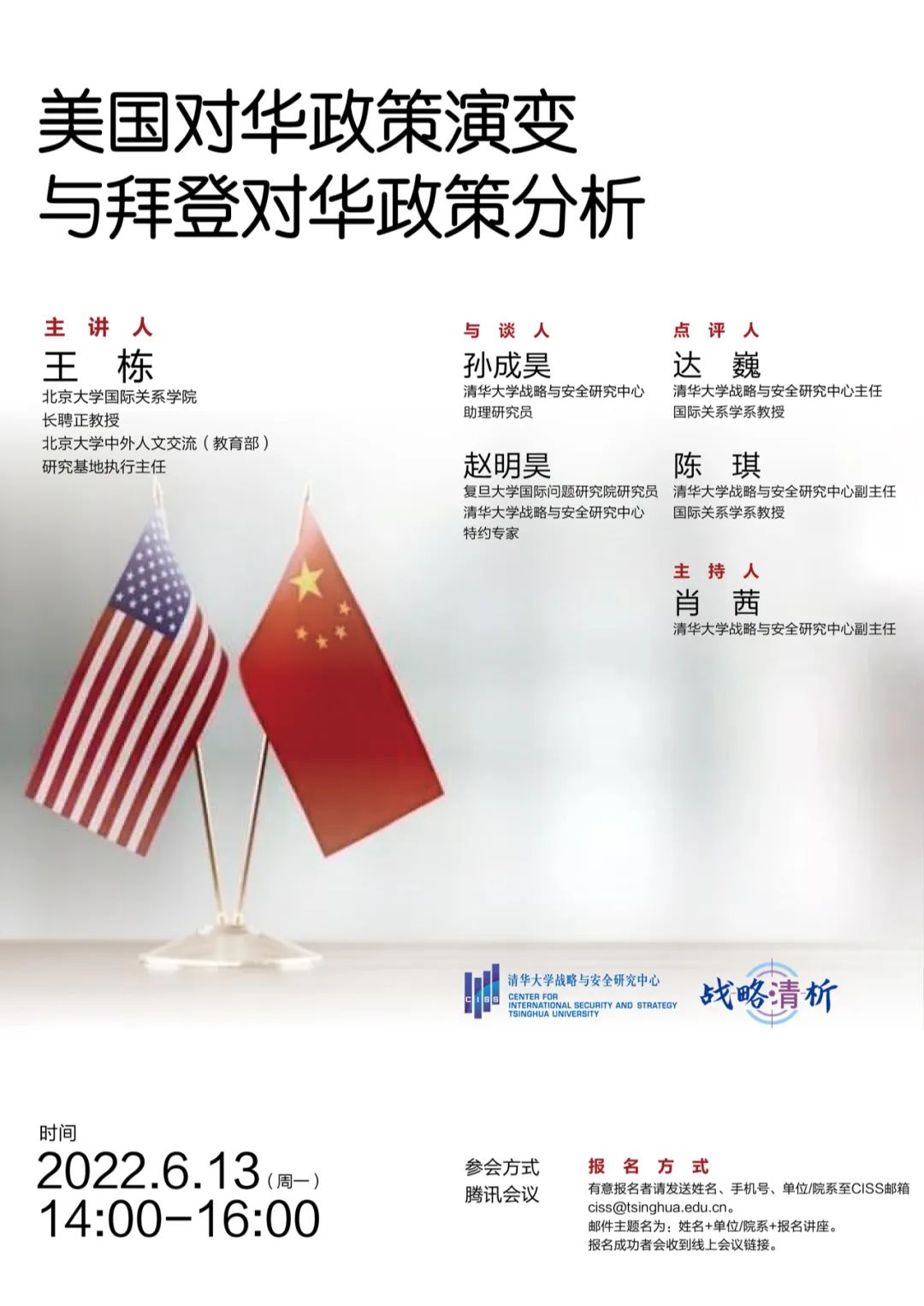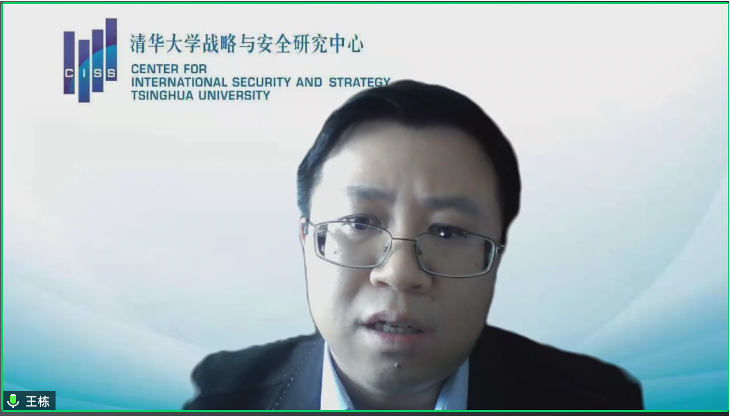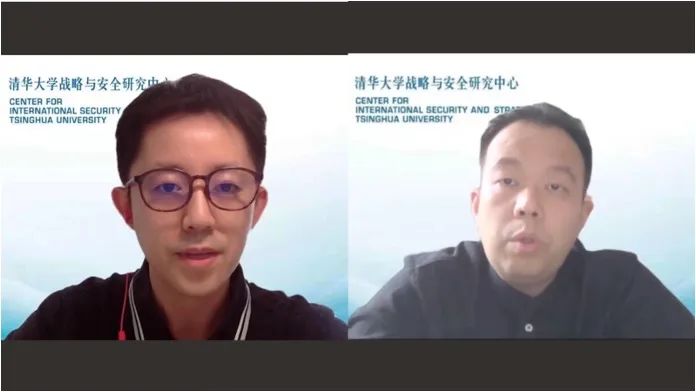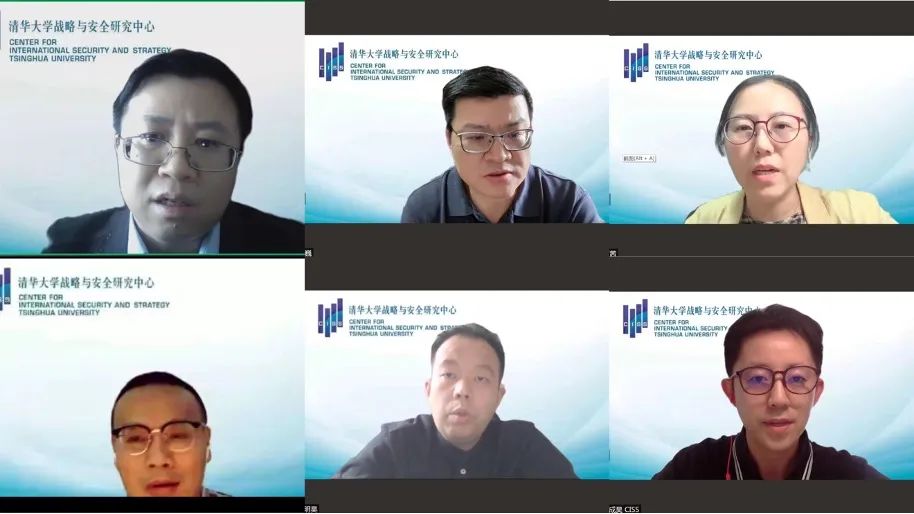On the afternoon of June 13, the Center for International Security and Strategy (CISS) of Tsinghua University held the 4th StratFocus Forum themed “Evolution of US Policy toward China and Analysis of Biden’s Policy toward China,” which attracted nearly 500 attendees online. Featuring Wang Dong, Tenured Professor at the School of International Studies, Peking University and Executive Director of the Institute for Global Cooperation and Understanding (iGCU), Peking University, as the keynote speaker, the virtual event also invited panelists Sun Chenghao, Fellow of CISS, and Zhao Minghao, Senior Fellow at the Institute of International Studies, Fudan University and Nonresident Senior Fellow at CISS. The discussants explored the changes in China-US relations and the evolution of US policy toward China, which was followed by comments from Da Wei, Director of CISS and Professor at the Department of International Relations, School of Social Science, Tsinghua University and Chen Qi, Deputy Director of CISS and Professor at the Department of International Relations, School of Social Science, Tsinghua University. The forum was moderated by Xiao Qian, Deputy Director of CISS.

In his keynote speech, Wang Dong pointed out four main perspectives, including the analysis of the theoretical framework of China-US relations, the evolution of US policy toward China, the basic logic behind Biden’s policy toward China after he took office and the policy recommendations in this regard. First, Wang pointed out the limitations of the “structural determinism” of the China-US relations with reference to an article published in Foreign Affairs in April 2021 and suggested to consider the influence of actors on the bilateral relations. Citing a famous Chinese idiom of “marking on a moving boat to find a sword,” which means to stubbornly stick to an ineffective method while disregarding any changes, Wang criticized the epistemic fallacy in the “Old Engagement Consensus” of the US on China and discussed the role of the US as the actor in bilateral relations based on the theories of cognitive psychology known as “attribution error” and “premature closure of belief system.” He pointed out that to understand the changes in the China-US relations, it is necessary to consider not only the structural factors, but also the role of actors. Second, Wang listed four stages in the evolution of US policy toward China and analyzed the impacts of such factors as the US presidential election, domestic divisions in US politics and the rising protectionism on its foreign policy and relations with China, predicting a comeback of “Trumpism” in 2024. Third, Wang believed that the Biden administration has formed a precise “Technology +” decoupling model, with the China-US decoupling in science and technology as its core and in forms of economy, trade and finance. Fourth, Wang proposed that in the next 5-10 years, China and the US shall restrike the balance in their relations, seek “Recoupling” based on mutual respect and equal treatment and shape the “New Engagement Consensus”. The essence of the competition between China and the US lies in self-improvement. China should be committed to deepening reform and constructing a new pattern of opening-up in all respects at a higher level so as to more closely connect to the world, participate in the international division of labor and lead the re-globalization progress.

Sun Chenghao and Zhao Minghao also shared their perspectives as the panelists. Sun talked about what has been “changed” and “unchanged” in Antony Blinken’s latest speech toward China in May, arguing that the general attitude of the US toward China has remained unchanged. Blinken’s speech explained the Biden administration’s fine-tuning in its competition strategy and tactics against China, including the clichés to “invest”, “align”, “compete” and “shape the strategic environment around Beijing.” Afterwards, when it comes to the main part of how the US will “align” with its allies, especially on the development of the China-US-Europe relations during the current Russia-Ukraine conflicts, Sun shared his viewpoints. He believed that the US is currently promoting the integration of the Eurasian strategy and “Indo-Pacific” strategy, but there remains a disparity in strategies toward China between the US and European countries. The Biden administration still regards Europe as a tool for great power competition while Europe is so overwhelmed with energy, food, refugees and other issues brought about by the conflict between Russia and Ukraine. Currently, Europe does not regard China as its top one enemy, and its geopolitical cognition is different from that of the US. In the long run, the US-EU alliance will still move toward a loose “issue-based alliance.” Specifically, to analyze whether the US can realize the alliance with Europe to contain China, Sun proposed that we should continue to follow and observe from three perspectives: Europe’s perception of the US, EU’s tendency to seek “strategic autonomy” and Europe’s perception of China.
Zhao added a new perspective that the evolution of US policy toward China is part of the adjustments in the US global strategy, which is currently a China-focused global strategy. Since the Biden administration came to power, there have been three prominent features in the US diplomatic strategy dominated by the great power competition. First, a clear domestic policy orientation, emphasizing that “diplomacy is an internal affair and vice versa,” with an attempt to create a new cycle of US national development. Second, the realistic “value-based diplomacy” that restores relations within the US and with its allies by values, and fully integrates such values into US policies of economy, technology, security and other aspects. Third, sophisticated great power competition that focuses on the cost-benefit balance. In the end, Zhao pointed out that China should clearly understand the changes in the US domestic climate and the logic behind the global strategy of the US to explore the correct way for the two countries to get along well with each other.

The keynote speaker and the panelists then took questions from the online audience.
Da Wei, Director of CISS and Chen Qi, Deputy Director of CISS, wrapped up the event with their comments. Da Wei applauded Wang’s dynamic research based on theoretical framework and proposed to look back on history for the analysis of China-US relations from four vertical perspectives: the power of ideas, capital, national strength (including military and economic strength) and race. He also agreed with Wang on his view that the changes in the China-US relations took place first in the US and that there are huge uncertainties when it comes to changes in China in the context of such international order. Chen believed that the most important factor driving the evolution of US strategy toward China is still the US perception of China as a rising power. After all, in the game of great powers, the relative ebb and flow of the competitors’ strengths are highly valued. As the US implements the strategy of great power competition against China, the current consensus between Beijing and Washington follows: first, both countries should pay attention to their own economic, social and political development and give full play to their respective institutional advantages; second, they should show their influence on the strategic environments surrounding the Asia-Pacific region and their neighborhoods; third, even if the US makes irrational decisions against China, scholars should still insist on rational and objective research to seek possibilities to improve and stabilize the China-US relations, cognizant of the fact that Washington’s irrational decisions may open the window of opportunity for Beijing. In Chen’s view, as a Chinese poem reads, “amid monkeys’ howl along the riverbanks, my skiff has travelled a thousand miles,” the changes in the China-US relations are becoming increasingly clear and certain amid bilateral climates.

